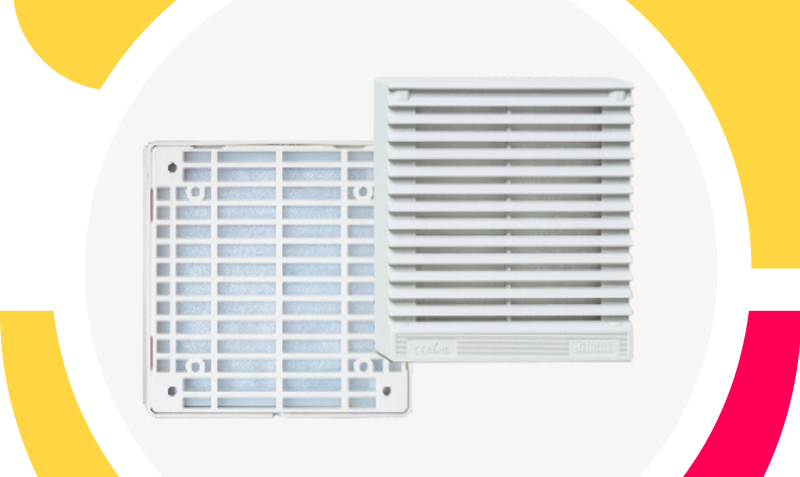The Impact of Clean Airflow: How Panel Fan Filters Improve System Efficiency
03 Oct 24
In today’s increasingly digital and technology-driven world, maintaining the efficiency and longevity of electronic systems and HVAC units is critical. One often overlooked component that plays a vital role in system efficiency is the panel fan filter. By ensuring clean and controlled airflow, these filters help maintain optimal operating temperatures and prevent the buildup of dust and debris, which can hinder performance.
In this blog, we’ll explore how panel fan filters work, their key benefits, and why choosing the right filter can make a big difference for your systems.
What Are Panel Fan Filters and How Do They Work?
Panel fan filters are specialized air filters installed within ventilation systems, server rooms, or HVAC units to purify the air flowing through fans. Their primary function is to trap dust, dirt, and other airborne particles, ensuring that only clean air reaches sensitive electronic components or enclosed spaces.
These filters come in a variety of sizes and materials, typically made from synthetic fibers, which are capable of trapping even the smallest particles. Once installed, panel fan filters improve both airflow quality and system efficiency.
The Importance of Clean Airflow in System Efficiency
Clean airflow is essential for the proper functioning of electronics and HVAC units. Without clean air, dust and debris can accumulate within the system, leading to potential overheating, blockages, and reduced overall efficiency. Panel fan filters address these issues by ensuring that only purified air circulates through the system.
When dust and dirt accumulate on internal components like fans, processors, or power supplies, it leads to overheating, which reduces the system's performance and can even result in costly shutdowns or repairs. Panel fan filters act as the first line of defense, preventing this accumulation and ensuring smoother, more efficient operation.
Benefits of Clean Airflow Include:
- Reduced Overheating: A cleaner system experiences less thermal stress, leading to longer-lasting components.
- Improved Performance: Without airflow restrictions caused by dust, systems can perform at optimal speeds.
- Energy Efficiency: Cleaner airflow means fans don’t have to work as hard to maintain desired temperatures, reducing overall energy consumption.
Key Benefits of Using Panel Fan Filters
Investing in high-quality panel fan filters provides several advantages for system efficiency, cost savings, and maintenance:
- Prolongs System Lifespan
By preventing dust from entering sensitive components, panel fan filters extend the lifespan of electronics and HVAC units. Clean airflow reduces the need for frequent repairs or replacements, ensuring that systems remain operational for longer periods.
- Reduces Maintenance Costs
Regular maintenance of air filters is much easier and more cost-effective than replacing entire components damaged by dust accumulation. Panel fan filters are designed for easy installation and removal, allowing for hassle-free maintenance.
- Energy Savings
When airflow is obstructed by dust, the system’s fans must work harder to maintain temperatures, resulting in higher energy consumption. Panel fan filters reduce this burden, helping you save on electricity bills by improving energy efficiency.
- Enhanced Air Quality
Beyond just improving the system's internal efficiency, panel fan filters contribute to better air quality in the surrounding environment. They remove harmful airborne particles, making them ideal for use in data centers, offices, and industrial spaces where clean air is crucial.
- Prevent Overheating and Component Damage
Overheating is a major cause of damage in electronic systems. By filtering out dust and debris, panel fan filters ensure that cooling fans can function optimally, preventing heat buildup that can damage sensitive components.
How to Choose the Right Panel Fan Filter for Your System
Not all panel fan filters are created equal. Selecting the right filter for your specific system can significantly enhance performance and longevity. Here are a few key factors to consider when choosing a filter:
- Size and Compatibility
Ensure that the filter fits properly within your system. Mismatched sizes can lead to poor airflow and reduce the efficiency of the filter.
- Filter Material
High-quality materials like synthetic fibers or woven fiberglass can trap smaller particles more effectively. Look for filters that provide high filtration efficiency while maintaining adequate airflow.
- Airflow Requirements
Different systems have varying airflow needs. If the filter restricts airflow too much, it can cause the system to overheat. Select a panel fan filter that balances filtration capacity with airflow requirements.
- Durability
Choose a filter that’s durable enough for long-term use, especially if you’re installing it in a demanding environment like an industrial space or server room.
- Ease of Maintenance
Opt for filters that are easy to clean and replace. This will reduce the time and costs involved in maintaining your system.
Conclusion: The Role of Panel Fan Filters in Improving System Efficiency
In summary, panel fan filters play a crucial role in maintaining clean airflow, which directly impacts system efficiency and longevity. By investing in the right filters and ensuring regular maintenance, you can enhance the performance of your systems, reduce energy costs, and extend the lifespan of essential components.
Whether you're managing an HVAC system, server room, or industrial environment, using panel fan filters ensures that your systems stay efficient, reliable, and cost-effective.
